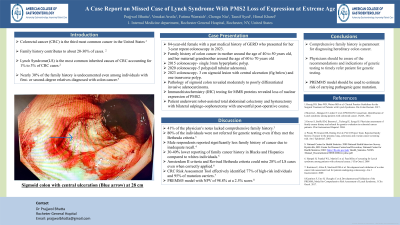Tuesday Poster Session
Category: Colon
P3731 - A Missed Case of Lynch Syndrome with PMS2 Loss of Expression at Extreme Age
Tuesday, October 29, 2024
10:30 AM - 4:00 PM ET
Location: Exhibit Hall E

Has Audio
- PB
Prajjwol Bhatta, MD
Rochester General Hospital
Rochester, NY
Presenting Author(s)
Prajjwol Bhatta, MD1, Venkat Arutla, MD1, Fatima Warraich, MD, MEHP1, Tausif Syed, MD2, Chengu Niu, MD1
1Rochester General Hospital, Rochester, NY; 2Rochester General Hospital, Greece, NY
Introduction: Colorectal cancer (CRC) is the third most common cancer in United States. A family history contributes about 20-30% of cases. Nearly 30% of the family history was undocumented, even among individuals with identified first or second-degree relatives with colon cancer. Here, we present a patient diagnosed with lynch syndrome in her 80s, despite having a family history of colon cancer in first degree relative.
Case Description/Methods: 84-year-old female who presented for her 3-year repeat colonoscopy in 2023. She reports family history of colon cancer diagnosed in her mother around the age of 40 to 50 years old, and grandmother around the age of 60 to 70 years old. The patient’s 3-year repeat colonoscopy in 2023 did show 3 cm sigmoid lesion with central ulceration was discovered at 28 cm. The pathology of the sigmoid lesion revealed moderately to poorly differentiated invasive adenocarcinoma of the sigmoid. Immunohistochemistry testing for MMR proteins revealed loss of nuclear expression of PMS2. she underwent robotic total abdominal colectomy, and a robot-assisted laparoscopic hysterectomy with bilateral salpingo-oophorectomy in same setting. The patient’s post-operative course was uneventful. The final surgical pathology revealed moderately differential adenocarcinoma of the sigmoid colon.
Discussion: Almost half (41%) of the physician notes lack comprehensive family history. This information highlights the critical gap in identifying patients at risk of LS. Males are more likely to lack of knowledge of paternal family history compared with women. 30-40% lower reporting of family cancer history in blacks and Hispanics compared to whites suggests a potential role of racial factors in contributing to incomplete family history data.
A CRC Risk Assessment Tool, using only three questions, effectively identified 77% of high-risk individuals and 95% of mutation carriers. Among all models, PREMM5, a widely used risk assessment tool, estimate the risk of carrying pathogenic gene mutation in LS. Unlike others, PREMM5 model is able to estimate the risk for all five LS associated genes. In conclusion, comprehensive family history is paramount to diagnose hereditary colon cancer. Our patient’s Lynch syndrome could have been diagnosed earlier if family history had been more thoroughly documented, enabling timely screening and intervention.
Disclosures:
Prajjwol Bhatta, MD1, Venkat Arutla, MD1, Fatima Warraich, MD, MEHP1, Tausif Syed, MD2, Chengu Niu, MD1. P3731 - A Missed Case of Lynch Syndrome with PMS2 Loss of Expression at Extreme Age, ACG 2024 Annual Scientific Meeting Abstracts. Philadelphia, PA: American College of Gastroenterology.
1Rochester General Hospital, Rochester, NY; 2Rochester General Hospital, Greece, NY
Introduction: Colorectal cancer (CRC) is the third most common cancer in United States. A family history contributes about 20-30% of cases. Nearly 30% of the family history was undocumented, even among individuals with identified first or second-degree relatives with colon cancer. Here, we present a patient diagnosed with lynch syndrome in her 80s, despite having a family history of colon cancer in first degree relative.
Case Description/Methods: 84-year-old female who presented for her 3-year repeat colonoscopy in 2023. She reports family history of colon cancer diagnosed in her mother around the age of 40 to 50 years old, and grandmother around the age of 60 to 70 years old. The patient’s 3-year repeat colonoscopy in 2023 did show 3 cm sigmoid lesion with central ulceration was discovered at 28 cm. The pathology of the sigmoid lesion revealed moderately to poorly differentiated invasive adenocarcinoma of the sigmoid. Immunohistochemistry testing for MMR proteins revealed loss of nuclear expression of PMS2. she underwent robotic total abdominal colectomy, and a robot-assisted laparoscopic hysterectomy with bilateral salpingo-oophorectomy in same setting. The patient’s post-operative course was uneventful. The final surgical pathology revealed moderately differential adenocarcinoma of the sigmoid colon.
Discussion: Almost half (41%) of the physician notes lack comprehensive family history. This information highlights the critical gap in identifying patients at risk of LS. Males are more likely to lack of knowledge of paternal family history compared with women. 30-40% lower reporting of family cancer history in blacks and Hispanics compared to whites suggests a potential role of racial factors in contributing to incomplete family history data.
A CRC Risk Assessment Tool, using only three questions, effectively identified 77% of high-risk individuals and 95% of mutation carriers. Among all models, PREMM5, a widely used risk assessment tool, estimate the risk of carrying pathogenic gene mutation in LS. Unlike others, PREMM5 model is able to estimate the risk for all five LS associated genes. In conclusion, comprehensive family history is paramount to diagnose hereditary colon cancer. Our patient’s Lynch syndrome could have been diagnosed earlier if family history had been more thoroughly documented, enabling timely screening and intervention.
Disclosures:
Prajjwol Bhatta indicated no relevant financial relationships.
Venkat Arutla indicated no relevant financial relationships.
Fatima Warraich indicated no relevant financial relationships.
Tausif Syed indicated no relevant financial relationships.
Chengu Niu indicated no relevant financial relationships.
Prajjwol Bhatta, MD1, Venkat Arutla, MD1, Fatima Warraich, MD, MEHP1, Tausif Syed, MD2, Chengu Niu, MD1. P3731 - A Missed Case of Lynch Syndrome with PMS2 Loss of Expression at Extreme Age, ACG 2024 Annual Scientific Meeting Abstracts. Philadelphia, PA: American College of Gastroenterology.
